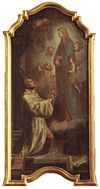Wincenty Kadłubek
Jędrzejów |
|---|
Wincenty Kadłubek (
The process of his canonization proved quite slow despite the initial momentum to see him proclaimed as a saint.[1] The cause languished for several centuries until 1764 when Pope Clement XIII beatified him.[2]
Early life and education
Little is known about Kadłubek's early life, but we do know he was born around 1160 to parents of elite status.[6] Eleventh and Twelfth century Poland was a complicated and turbulent place, shaping Kadłubek's works and life. This period of time is characterized by territorial divisions between branches of the Piast family and civil war. [6][4]
Kadłubek first studied in
Kadłubek was considerably educated for the time period. He was knowledgeable of medieval and classical literature, spoke Greek, French, and Latin, and had a meticulous knowledge of Roman and Canon law.[7] At the time, you could only learn about Roman and Canon law at schools in Paris and Bologna. He was the first known Polish lawyer to contribute to Polish legal scholarship.[5] Kadłubek's Chronica Polonorum (Chronicle of Poles) confirms he was a lawyer. Through this chronicle, he was the first Polish person to chronicle Polish history, making him a cardinal source for the early medieval history of Poland.[6]
Time as a bishop
Kadłubek was elected to be a bishop in 1208.
He set out to reform the diocesan priesthood to ensure their holiness while also seeking to invigorate the faithful to active participation in ecclesial affairs.
The bishop was noted for his linguistic skills and his charismatic preaching; Kadłubek was known also for his expertise in
He followed Gallus Anonymus in further developing the idea of the Latin proverb "vox populi vox dei" ("the voice of the people is the voice of God") and argued that the ruler (king) should follow a council that includes bishops and representatives of clans since not the ruler but the council has higher power originating from the laws that God instituted. He also claimed that the council should elect the ruler and that rulers abusing their power should be removed from their position.[8]
Later life
In 1217, Kadłubek decided to resign from his duties as a bishop. He spent his last years at the Cistercian monastery in Jędrzejów, making him the first Bishop of Krakow to join the Cistercian order after voluntarily abdicating. This also made him the first Polish person in the Cistercian monastery in Jędrzejów, which was composed of exclusively French monks at the time. The fire of the Jędrzejów monastery in 1800 in combination with the turbulence of Polish history at the time makes it difficult to understand the remaining years of his life.[5] He likely continued to write the Chronica Polonorum into this time.[6]
Kadlubek died on March 8, 1223, retaining his bishop's pallium, buried in the Jędrzejów monastery,[5] his remains were interred before the high altar of the convent church. His remains were exhumed on 26 April 1633 with his pallium found intact though his remains had become skeletal. Measurements were taken and it was surmised that he was of "fair height".[1] His remains were moved to a new location before the high altar on the following 16 August. Kadłubek's remains were again exhumed and reinterred in mid-1765 and some were moved to Sandomierz in 1845 for veneration. Other parts to his remains were moved in 1903 to Wawel and placed in a silver urn.[2][3]
Beatification

In 1634 the Polish episcopate made a petition to
In 1761 the king Augustus III sent two letters to Pope Clement XIII requesting the canonization which prompted the pope to order another process of investigation. That investigation proved to be successful for Clement XIII issued a papal bull in which he beatified the late bishop on 18 February 1764.[2] On 9 June 1764 the pope issued another bull that allowed for a Mass and the Divine Office to be said in his honor in Kraków and among the Cistercians.
He is referred to in Poland as a saint despite the fact that he has not been canonized as such; Cardinal
Efforts to resume the cause
There had been several efforts since his beatification to resume the cause and achieve his canonization though each attempt failed. Cardinal Stefan Wyszyński and Karol Józef Wojtyła (the future Pope John Paul II) both supported his cause in 1964 with Wojtyła referring to the late bishop as the "Father of Polish culture".[1]
In 1972 the
Works

His best-known work - Chronica seu originale regum et principum Poloniae (Chronicles of the Kings and Princes of Poland) - is a historical compendium of Poland in four volumes.[2] The first three volumes take the form of a dialogue between Archbishop John of Gniezno and Bishop Mateusz. The first volume's sources are legends while the second is based on the chronicle of Gallus and the last two are based upon Kadłubek's own experiences. Writing this work made him the first Polish native to chronicle Polish history.[7]
This work had a huge impact on the Polish political doctrine of the 14th and 15th centuries co-authored by
References
- ^ a b c d e f g h i j k "Beato Vincenzo Kadlubek". Santi e Beati. Retrieved 14 October 2017.
- ^ a b c d e f g h i "Blessed Vincent Kadlubek". Saints SQPN. 6 March 2017. Retrieved 14 October 2017.
- ^ a b c d e f g "Blessed Wincenty Kadłubek". The Wawel Royal Cathedral of Saint Stanislaus B.M. and Saint Weneceslaus M. Retrieved 14 October 2017.
- ^ JSTOR 48577798.
- ^ a b c d e f g h i j Blicharz, Grzegorz. "Wincenty Kadłubek, Magister Vincentius (ca. 1150–1223)".
- ^ ISSN 0032-2970.
- ^ ISSN 2207-2802.
- .
- ^ "Blessed Vincent Kadlubek". New Advent. Retrieved 14 October 2017.
